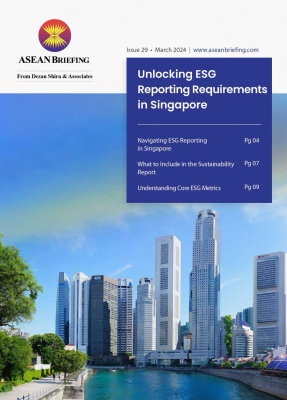
Unlocking ESG Reporting Requirements in Singapore
Published: March 2024In this latest issue of ASEAN Briefing, we dive into the regulatory requirements of ESG reporting in Singapore before describing what needs to be included in an ESG report. Finally, we discuss the ESG core metrics within an ESG framework.
In Singapore, Environmental, Social, and Governance (ESG) reporting is increasingly vital as businesses recognize the necessity of addressing sustainability concerns and meeting stakeholder expectations. The Singapore Exchange (SGX) mandates all listed companies to disclose their sustainability practices and performance in their annual reports through a "comply or explain" approach.
The SGX provides guidelines through its Sustainability Reporting Guide, often leveraging the Global Reporting Initiative (GRI) Standards as a framework. Additionally, companies are urged to adopt Task Force on Climate-related Financial Disclosures (TCFD) recommendations to disclose climate-related risks.
The core of Singapore’s ESG strategy is the Green Plan 2030. The roadmap aims to advance the city-state’s national sustainable development by 2030. As such, sustainable practices ensure that a business can continue to operate over the long term by conserving resources, reducing waste, and minimizing environmental impact.
In this latest issue of ASEAN Briefing, we dive into the regulatory requirements of ESG reporting in Singapore before describing what needs to be included in an ESG report. Finally, we discuss the ESG core metrics within an ESG framework.

